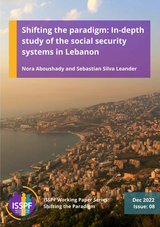
Shifting the paradigm: in-depth study of the social security systems in Lebanon
Aboushady, Nora / Sebastian Silva LeanderExternal Publications (2022)
in: ISSPF Working Paper Series 08/2022
Lebanon is facing multiple economic and social challenges that require substantial macroeconomic reforms to rebuild the economy. However, in the absence of universal and comprehensive social security, economic growth and long-term development are arguably unattainable. Guaranteeing basic income security to everyone is a prerequisite for building a resilient economy and society, in Lebanon as elsewhere. Echoing calls from other actors, this study has argued that a universal social system ideally begins with at least child, disability, and old age benefits. For the system to be universal, benefits can be either entirely financed by the general taxes or can be provided through a mix of contributory and tax-financed schemes. Over the short term, given the urgent needs across the population, reallocation of public expenditure towards social policy would likely be required. However, over the longer term, sustained investment in inclusive social security will require a set of fiscal policy reforms that increase public resources, as well as ensuring that the share of social policy investment as a percentage of overall investment grows over time. Growing public resources requires building trust in government through investment in high-quality social services and adequate income transfers, which, in turn, will enable expansion and upgrade of social services and benefits.

